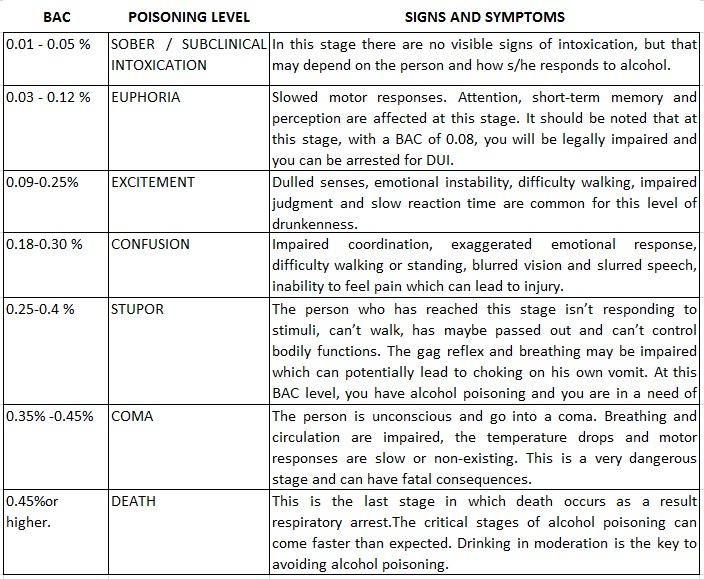ARTICLE OVERVIEW: Alcohol poisoning usually occurs with binge drinking. It is a very serious and potentially fatal condition. We review symptoms and what to do in an emergency here.
TABLE OF CONTENTS
- What Is Alcohol Poisoning?
- Causes
- Symptoms
- Alcohol Poisoning BAC
- Alcohol Poisoning Levels
- When to Call 911
- Poisoning or Hangover?
- How Long Does Alcohol Poisoning Last?
- How to Treat Alcohol Poisoning
- Can Alcohol Poisoning Kill You?
- How to Prevent Alcohol Poisoning
- Getting Help
What Is Alcohol Poisoning?
Alcohol poisoning, or “alcohol overdose”, is a serious and sometimes fatal consequence of drinking too much alcohol in a short period of time. When there is too much alcohol in the bloodstream, your system shuts down. Involuntary actions like
- Breathing
- Heart rate
- Temperature control
and the gag reflex that prevents choking are impaired.When someone is poisoned by alcohol, s/he will eventually stop breathing or choke on their own vomit…leading to coma or death. Even if you survive the poisoning, you can suffer long-lasting brain damage.
What Causes Alcohol Poisoning?
One of the mains causes of alcohol poisoning is binge drinking. The National Institute on Alcohol Abuse and Alcoholism (NIAAA) defines binge drinking as a pattern of heavy drinking that brings blood alcohol concentration (BAC) levels to 0.08 g/dl or above.[1] This happens when:
Men consume 5 or more drinks in 2 hours or less.
Women consume 4 or more drinks in 2 hour or less.
According to the Centers for Disease Control, on average there are six alcohol poisoning deaths every day or approximately 2,200 a year.[2] Drinking on empty stomach increases your risk for poisoning, as the rate of alcohol absorption is faster. Mixing drugs and alcohol also increases the risk of poisoning. Butcertain groups of people also have an increased risk of alcohol poisoning. These include:
Young people: Teens and adolescents are more likely to binge drink and are not experienced enough to know when to stop. Drinking games also put this group at risk.
Females: Women are usually smaller, have more body fat, and lower total body water content than men. Also, their ability to metabolize alcohol can be affected by menstrual cycle and higher levels of estrogen.
People in poor health: People with poor health are more vulnerable to the damaging effects of alcohol.
People with low height to weight: In this group of people, alcohol can enter the bloodstream faster.
Symptoms of Alcohol Poisoning
Knowing the signs and symptoms of alcohol poisoning might save someone’s life.The usual symptoms include:
- Bluish skin color or paleness
- Dulled senses
- Impaired coordination
- Low body temperature
- Mental confusion
- Seizures
- Slow heart rate
- Slow or irregular breathing
- Sweaty skin
- Unconsciousness or difficulty staying conscious
- Vomiting
Keep in mind that a person experiencing alcohol poisoning may not have all of the symptoms listed here, and don’t forget that alcohol poisoning can lead to long- lasting brain damage or death.
Always seek medical help when someone passes out.
Alcohol Poisoning BAC
The risk of alcohol poisoning is measured by Blood Alcohol Concentration (BAC). BAC measures the percent of alcohol in your bloodstream, breath or urine. It expresses the weight of ethanol in grams, in 100 milliliters of blood, or 210 liters of breath. In most states, a BAC of .08 is considered legally intoxicated.
As BAC increases, the risk of alcohol poisoning increases as well.
Age, weight, gender, metabolism, and alcohol tolerance are factors that can determine how quickly the body processes alcohol and the amount it can tolerate. That is why two people who have consumed the same amount of alcohol may have different BAC levels. There are tools like Calculator: Calculate Your Blood Alcohol Content to estimate your BAC. [3]
As BAC increases, the risk of alcohol poisoning increases as well.
Alcohol Poisoning Levels
There are predictable stages of alcohol poisoning, buthow fast an individual will reach each stage and what symptoms will it manifest, depends on metabolism and the factors listed above in the article.

An unconscious person who has been drinking is at risk of dying.
When to Call 911
Deciding if someone has an alcohol poisoning can be tricky. Err on the side of caution instead of risking serious consequences.
If you suspect that someone has alcoholpoisoning, call 911 or the Poison Control Center at 1-800-222-1222 for immediate medical assistance.[4] Also, be prepared to give relevant information about the kind of alcohol and the amount the person drank.
So, what can you do while waiting for help to come?
Check their breathing.
If conscious, try keeping them awake.
If possible, try keeping them hydrated.
Keep them in a sitting position.The person’s gag reflex may be impaired so it is important to try keeping the victim in a sitting position in order to avoid choking on his/her vomit and breathing problems.If, however the person lies down turn his/her head on the side to prevent choking. Never lie them on the back.
Never assume that the person will get better if it get some sleep. Be aware that even if someone has stopped drinking, there is risk of alcohol poisoning for some time afterward. That is because the heart keeps pumping and alcohol continues to enter the bloodstream and circulate in the body.
Act immediately!
Don’t hesitate to call 911 or the Poison Control Center.
Poisoning or Hangover?
There is a big difference between alcohol poisoning and a hangover. A hangover occurs when you drink too much and the body responds. It’s like a big, “OUCH!” or a group of unpleasant signs and symptoms to remind you not to do it again. Typically, hangovers after a single night’s drinking go away on their own…but alcohol poisoning requires immediate medical assistance.
Alcohol poisoning is dangerously drinking too much. Binge drinking 4 or more drinks for women or 5 or more drinks for men in a short period of time typically leads to high blood alcohol concentration. Then, alcohol depresses nerves that control involuntary actions such as breathing and the gag reflex. Large doses of alcohol will eventually stop these functions.
As a general rule, the more alcohol you drink, the higher your risk of a problem.
Q: How can you tell the difference between a hangover and poisoning?
A: Count your drinks. What tips the balance from drinking that produces impairment to drinking that puts one’s life in jeopardy varies among individuals. Age, sensitivity to alcohol, gender, speed of drinking, medications you are taking, and amount of food eaten can all be factors.
How Long Does Alcohol Poisoning Last?
Acute poisoning effects can last for as long as you continue drinking, and can be fatal if left untreated. Full recovery may take days, or even weeks, depending on the severity of the case. After being released from hospital, some people can take up to a month to start feeling normal again.
In general, the effects of alcohol are usually felt within 10 minutes and then peak at maximum an hour after consumption. If you binge drink and start experiencing alcohol poisoning symptoms your BAC will continue increasing for 30 – 40 minutes after the last drink. That is because the liver is still processing the alcohol.
But alcohol poisoning can last from hours to several days.The only thing that reverses the effects of alcohol is time…something you may not have if you are suffering from an alcohol overdose.
How to Treat Alcohol Poisoning
Call 911 when you suspect alcohol poisoning. The condition requires advanced treatment techniques. This person is in a life or death situation and needs immediate medical care.Possible interventions can include:
- Give activated charcoal.
- Give oxygen therapy or use a respirator.
- Give vitamins and glucose to prevent further complications.
- Monitor vital signs.
- Prevent breathing or choking.
- Prevent dehydration.
- Pump the stomach to minimize the body’s alcohol absorption.
Again, alcohol poisoning is typically treated in an emergency department. Prompt medical treatment is very important in cases of overdose, and doctors have to recognize and treat the dangerous condition. Do not attempt to wake a person up, give them a shower, or have them drink coffee.
Call 911 in any case of suspected alcohol poisoning.
As you’re waiting for medical help, you can:
- Monitor airway and breathing.If you know CPR, use it as needed.
- Stay with the person at all times.
- Turn the person on the side to prevent inhaling of vomit.
- Watch for seizures.
Treatment and observation will last until the vital signs return to normal. Full recovery may take days, or even weeks, depending on the severity of the case. During this period, the person may feel depressed, loss of appetite, discomfort, and memory problems.
Can Alcohol Poisoning Kill You?
Yes, alcohol poisoning can be fatal.Very high levels of alcohol in the body can shutdown critical areas of the brain that control breathing, heart rate, and body temperature, resulting in death. The following may happen if alcohol poisoning is ignored and/or goes untreated:
- Breathing slows, becomes irregular, or stops.
- Dehydration can cause seizures, permanent brain damage, or death.
- Low body temperature or hypothermia.
- Too little blood sugar can lead to seizures.
- The heart beats irregularly or stops.
- You can chokes on your own vomit.
According to the Centers for Disease Control, an average of 6 people die of alcohol poisoning each day in the U.S.[2] Alcohol poisoning deaths affect people of all ages but are most common among middle-aged adults and men. For example, 3 of 4 of those (76%) of alcohol poisoning deaths are among adults ages 35 to 64. Likewise, about 76% of those who die from alcohol poisoning are men.
How to Prevent Alcohol Poisoning
The best way to prevent alcohol poisoning is to drink moderately. Smart drinking can also help prevent problems. Take responsibility and educate yourself about the dangers it encompasses. Implement the following strategies to reduce the chances of overdose:
- Don’t accept drinks from stranger or from suspicious sources.
- Don’t indulge in rapid binge drinking.
- Eat before you drink.
- Never mix alcohol with drugs or medication.
- Stay hydrated. Drink water in between alcohol.
- Stop drinking altogether.
If you crave alcohol and can’t stop drinking, you may need help. Give us a call to learn about rehab.
Don’t Let Alcohol Poisoning Happen
You can prevent alcohol poisoning 100%. Only you can keep your alcohol intake within the safe limits. Monitor what you drink how much you drink and how fast you drink.Know your tolerance and avoid extremes.
If you or a loved one exhibits risky drinking habits, it can be a cry for help. There is always a way out. Recovery is possible. Seeking treatment is sometimes the best option because it helps people to learn to say, “No,” and get their life in control.
Don’t wait, ask for help today.
Our compassionate hotline operators are waiting for your call.
If you need help, feel free to call us. OR, leave us a message in the comments section below. We love to hear from our readers. And we try to answer all real-life comments with a personal and prompt reply.
Reference Source: [1] NIAAA: Drinking Levels Defined
[2] CDC: Alcohol Poisoning Deaths
[3] Cleveland Clinic: Calculate Your Blood Alcohol Content
[4] Poison Control Center: Online Tool
Addiction Blog: How long does alcohol last in the body?
College Drinking: Facts About Alcohol Overdose (or Alcohol Poisoning)
Mayo Clinic: Hangovers
NIAAA Facts and Brochures: Understanding the Dangers of Alcohol Overdose
Pennsylvania Department of Drug and Alcohol Programs: Alcohol Poisoning or Overdose
Princeton University: First Aider’s Guide to Alcohol
Texas Alcoholic Beverage Commission: Alcohol Poisoning
University of Oklahoma Department of Medicine: Stages of acute alcoholic influence/ intoxication









Related Posts